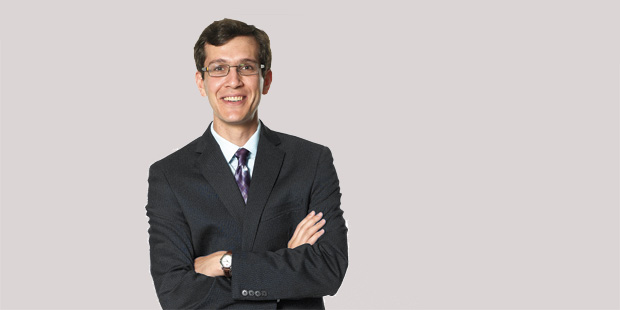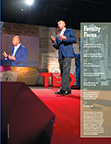Introducing David Kamin ’09
Assistant Professor of Law
Printer Friendly VersionIn early 2012, when President Obama’s economic team was putting together the 2013 federal budget, Treasury Secretary Tim Geithner and Jack Lew, then-director of the Office of Management and Budget (OMB), were debating how much money would be saved by ending the Iraq war and how it should be accounted for. They turned to the young assistants at the side of the room, zeroing in on David Kamin—probably the youngest-looking of them all. “You could tell from his expression that he knew the answer but was too polite to interrupt,” says Jason Furman, deputy director of the National Economic Council (NEC).
Kamin gave the number and an explanation. Everyone took it as fact, and moved on.
“Regardless of who is in the room, there’s one authoritative voice when it comes to the budget, and that’s David,” says the NEC’s Michael Pyle, special assistant to the president for financial and international markets. Even Geithner has been known to reach outside of his staff to seek Kamin’s advice. “David Kamin has been making invaluable contributions on budget and tax policy since the very beginning of this administration. His deep knowledge of the numbers and intricacies of the budget has helped win him the respect of the entire economic team,” says Geithner.
Before leaving his NEC position as special assistant to the president for economic policy to join the faculty of his alma mater this fall, Kamin, 31, had made a significant impact on important legislation. He influenced Obama’s healthcare law, and the continuation of the payroll tax cut and unemployment insurance. He played a role in resolving the debt crisis last year and in crafting each of the president’s budgets. He was one of the main authors of Obama’s plan to rescue the U.S. Postal Service from bankruptcy. While by all accounts he is cool under fire, “I’m looking forward to getting a little bit off of the high-wire act,” Kamin says of his move to academia.
Kamin’s scholarship, an outgrowth of his real-world work, shows how budget and tax metrics can deeply influence policy debates, even as they are frequently misunderstood. In “What Is a Progressive Tax Change? Unmasking Hidden Values in Distributional Debates” (NYU Law Review, 2008), Kamin asks what it means for a tax change to be progressive or regressive. He delves into underlying theories of tax fairness and concludes that measures of progressivity are often used in misleading or incoherent ways.
“Risky Returns: Accounting for Risk in the Federal Budget” has yet to be published but, according to colleagues, is nonetheless widely debated in the capital. It argues against the emerging consensus that federal budgeting should take into account the “cost of risk”—the amount that the private market would demand to bear uncertainty. Doing so dramatically increases the price tag on many federal programs. When the bailout was budgeted this way, for example, the cost was doubled. Kamin argues that this adjustment undermines the budget as a measure of the federal government’s fiscal position and confuses cost-benefit analysis with budgeting.
Kamin’s love of policy and public service is born and bred. His father, Alan, now retired, was a judge in the Arizona Superior Court for 20 years after having served as an assistant attorney general. Trained as a tax lawyer, he once worked for Ralph Nader on tax reform. Kamin’s mother, Carol, now a public policy consultant, served three Arizona governors and was the director of the first-ever Governor’s Office for Children. “Public policy and law would define our conversations around the dining room table,” says Kamin, who has an older brother, Daniel.
In high school, Kamin ran cross-country and still runs six miles each morning, but otherwise was a bit of a nerd. “My mother set up a high school class trip to visit the Center on Budget and Policy Priorities (CBPP) in Washington, D.C.,” he recalls. “I found it fascinating.”
Kamin earned his bachelor’s degree in economics and political science from Swarthmore College, giving the commencement address in 2002. He then worked at the Committee for Economic Development in Washington, followed by two years as a research assistant at the CBPP, where he learned how to “spreadsheet a budget,” and worked on some projects with Peter Orszag, then at the Brookings Institution. He attended NYU Law in part because he was offered a Furman Academic Scholarship (founded by Jason Furman’s family), an opportunity that provided an intellectual community and support system for those preparing to enter academia. “I loved the idea of being able to sit in seminars discussing papers on a variety of legal topics from the get-go,” says Kamin. His enthusiasm for tax law and policy was evident to all. “He’s possibly the best student I’ve had,” says Wayne Perry Professor of Taxation Daniel Shaviro. Clayton Gillette, Max E. Greenberg Professor of Contract Law, concurs: “His comments were so thoughtful and so provocative that I often felt that I was the student.”
Kamin was sitting in class during his final semester in the fall of 2008 when he received a phone call. It was Orszag, newly appointed director of the OMB, asking him to serve as his special assistant. At the OMB, Kamin would attend meetings with Orszag, Geithner, and then-NEC director Lawrence Summers. “It was the moment I had always hoped for. To be able to inform those kinds of discussions. But to have it happen that quickly—there was this moment of ‘Wow. I’m actually sitting here,’” recalls Kamin, who commuted back from D.C. to take his finals.
From the start, Kamin was a standout. Most White House staffers attended meetings with a notebook. “But David always wanted to have his numbers close at hand,” says Avi Feller, who worked with Kamin at the OMB. “He’d pull out his laptop and was prepared with every spreadsheet you could imagine.” Indeed, there was a stretch of time during Obama’s transition when the sole repository of the nation’s new budget was Kamin’s laptop.
Kamin married Heather Weyrick, 32, in 2004. In many ways, they couldn’t be more different. As a freelance TV producer, Weyrick has worked on everything from travel shows to a piece on cupcakes. “She rounds me out. There’s no doubt she’s the cooler half of this marriage,” he says. “She is the one who brings pop culture into my life, but I’m still somewhat ignorant.” In August, the couple welcomed their first child, Iris. Their dog, Mitzi, and cat, Kitty, are adjusting. Having spent the last few years within a three-block radius of the White House, Kamin is enjoying being back in New York. “Some people dream to be an astronaut,” says Kamin. “I dreamed to be a public policy wonk, and I got to live that out.”
—

